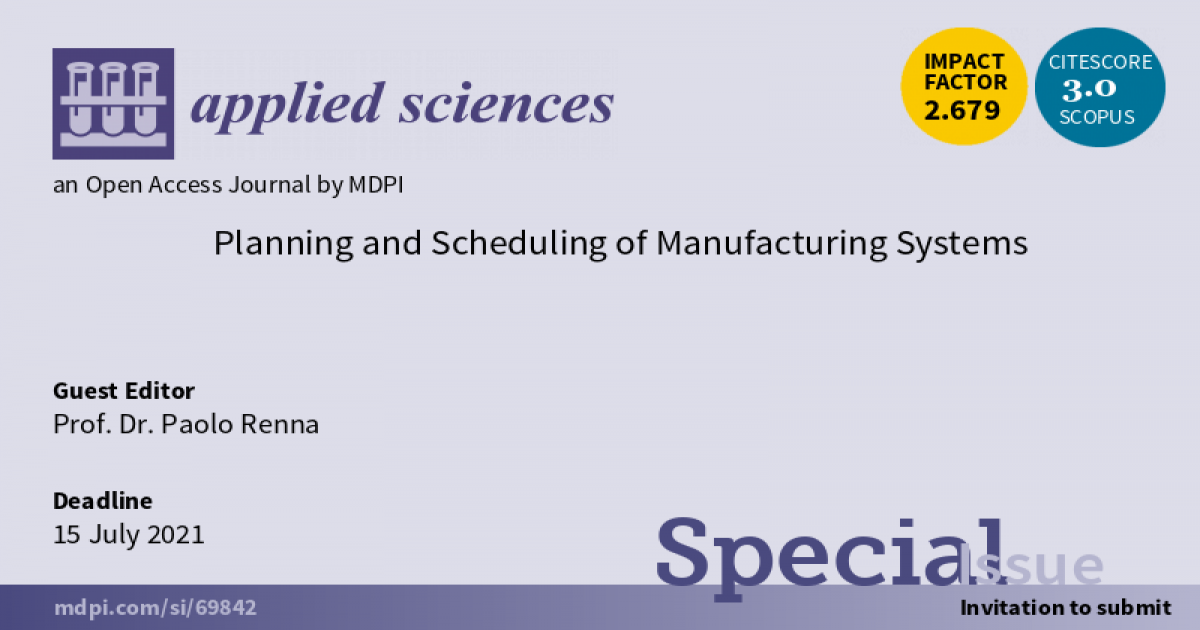- 2.5Impact Factor
- 5.5CiteScore
- 17 daysTime to First Decision
Planning and Scheduling of Manufacturing Systems
This special issue belongs to the section “Applied Industrial Technologies“.
Special Issue Information
Dear Colleagues,
This Special Issue is dedicated to the latest findings concerning planning and scheduling of manufacturing systems methods. The “Fourth Industrial Revolution” (alternatively known as “Industry 4.0”) is driving a technological and organizational transformation of the manufacturing environment. The classical production planning approaches are not able to react to real-time data or use new paradigms as the cloud manufacturing systems enabled by the 4.0 industrial revolution. Therefore, new production planning and scheduling of the manufacturing systems will be developed to take the advantage of the 4.0 industrial revolution. This Special Issue will collect a series of works that summarize the latest trends in the field of Planning and Scheduling of Manufacturing Systems to improve the responsiveness, efficiency, sustainability, and other methods to support the 4.0 paradigms. All experts are invited to contribute to delineating the future of ‘Planning and Scheduling of Manufacturing Systems’ by submitting their contributions.
Prof. Paolo Renna
Guest Editor
Manuscript Submission Information
Manuscripts should be submitted online at www.mdpi.com by registering and logging in to this website. Once you are registered, click here to go to the submission form. Manuscripts can be submitted until the deadline. All submissions that pass pre-check are peer-reviewed. Accepted papers will be published continuously in the journal (as soon as accepted) and will be listed together on the special issue website. Research articles, review articles as well as short communications are invited. For planned papers, a title and short abstract (about 250 words) can be sent to the Editorial Office for assessment.
Submitted manuscripts should not have been published previously, nor be under consideration for publication elsewhere (except conference proceedings papers). All manuscripts are thoroughly refereed through a single-blind peer-review process. A guide for authors and other relevant information for submission of manuscripts is available on the Instructions for Authors page. Applied Sciences is an international peer-reviewed open access semimonthly journal published by MDPI.
Please visit the Instructions for Authors page before submitting a manuscript. The Article Processing Charge (APC) for publication in this open access journal is 2400 CHF (Swiss Francs). Submitted papers should be well formatted and use good English. Authors may use MDPI's English editing service prior to publication or during author revisions.
Keywords
- Production planning
- scheduling
- manufacturing systems
- cloud manufacturing
- responsiveness
- Industry 4.0
- simulation

Benefits of Publishing in a Special Issue
- Ease of navigation: Grouping papers by topic helps scholars navigate broad scope journals more efficiently.
- Greater discoverability: Special Issues support the reach and impact of scientific research. Articles in Special Issues are more discoverable and cited more frequently.
- Expansion of research network: Special Issues facilitate connections among authors, fostering scientific collaborations.
- External promotion: Articles in Special Issues are often promoted through the journal's social media, increasing their visibility.
- Reprint: MDPI Books provides the opportunity to republish successful Special Issues in book format, both online and in print.


